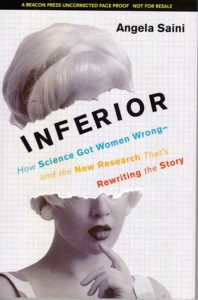Book Review: Inferior by Angela Saini
Disclaimer: I received this Uncorrected Page Proof as a Goodreads giveaway for the purpose of writing this review. No other compensation was requested or offered. Some material may be changed in the final product, due out 5/23/17.
Today there was a news story about a member of the European Parliament arguing against equal pay for women on the grounds that “they are weaker, they are smaller, they are less intelligent.” Unsurprisingly, this MEP was male. Equally unsurprising was the tongue-lashing he got from a fellow MEP who happened to be female. But while it’s unusual for a theoretically respectable politician to say these things in public nowadays, it is a current of thought that stretches back to at least the ancient Greeks. And often science has been misused to justify such attitudes.
This book is mostly about the science of sex differences (that is, “how are men and women different?”) and how that science has been interpreted over the years to justify sexism and resistance to social change on the subject, but also about contrary evidence and theories that paint a more egalitarian picture. The author is an award-winning British science journalist who was assigned to write a piece on menopause but found enough material for this book.
The book begins with Charles Darwin claiming that women were less evolved than men for reasons. Then it covers multiple subjects such as brain imaging and primatology on the way to the riddle of why women don’t just die when they become infertile. (The last has two major competing hypotheses named “The Grandmother Hypothesis” and “The Patriarch Hypothesis”; all the scientists that have gone on record as supporting the latter are male.)
There’s a reference list for each chapter, and will be an index in the final product. There may be illustrations in the published version; there were none in the proof copy.
A repeated theme of the book is the suggestion that many sex difference researchers started from “essentialism”, the basic assumption that men and women are different in fundamental ways, and then did their research in such a way as to disproportionately focus on the ways the sexes are different, rather than similar, and sometimes even finding differences that don’t appear to actually exist. It’s also notable that several male researchers come across as dismissive of research done by scientists (particularly women) whose results contradict their own theories. One, for example, admits that he’s never studied bonobos himself, but clearly the research results found by a woman must be wrong since it’s different from what he learned by studying chimpanzees.
The writing is clear and concise, and should be readable by bright high school students on up (although some parents may find parts of the subject matter, such as the existence of intersex people, uncomfortable.) Recommended to those interested in science, feminism and the intersection of the two.


I think any parent who’s open to teaching their children about feminism should be able to cope with the mere existence of intersex people. Otherwise, they’re a pretty poor excuse for a feminist, for a start.
‘Tis true, but I know I sometimes have conservative parents reading these reviews, so best to be up front.
I do not understand why you say “The Grandmother Hypothesis” and “The Patriarch Hypothesis” are competing hypothesis to explain why women become infertile with age. As far as I have understood the Grandmother Hypothesis explains why women have a menopause while the Patriarch Hypothesis explains why men don’t, so they don’t compete, as they have different
Could you elaborate this further?
According to the book, the competing hypotheses are attempting to explain why women *survive* menopause, something found rarely in other mammalian species. The Grandmother Hypothesis suggests that a favorable mutation in humanity’s ancestors caused a few women to survive past the loss of fertility, and the advantages of having an elder to help raise grandchildren meant their genes got passed on at a higher rate. The Patriarch Hypothesis counters that older women become infertile because men prefer to mate with younger women, so women evolved to have menopause once they were no longer desirable.
Okay, that is not what I learned about the two hypothesis. (Altough I have to note that I’m a plant biologist, so I may have misunderstood the behavorial biology courses at the university).
As far as I recall my professor explained the two theories like that:
1. Observation: Women continue to live after menopause.
2. Question: Why does that happen? After all non-reproducing members of a species still consume resources thus lowering the reproduction rate of the whole species which is a disadvantage in evolution.
3. Grandmother Hypothesis: Older women help their children raise grandchildren improving their survival chances and thus the reproduction rate of the whole species which is an advanatage.
4. Observation: In men spermatogenesis continues until death (the oldest known father was 94 when he sired the child).
5. Why does that happen? Why don’t older men also become infertile and help raising grand-children? Particularly, since once grandma is past her menopause grandpa cannot reproduce anyway regardless of whether he is still fertile, making continued spermatogenesis a waste of energy.
6. Patriarch Hypothesis: Older men used to mate with younger women after their first wife had her menopause, so their continued spermatogenesis was an advantage.
I would also like to point out that the partriarch hypothesis as presented in this book makes no sense, as it does not explain why women continue to live after menopause. If indeed Menopause would have evolved because men didn’t want to mate with older women then this older women would still consume resources for no benefit of the species. So unless these women do contribute to the fitness of the species as a whole (e.g. as per the grandmother hypothesis) menopause would still be maladaptive.